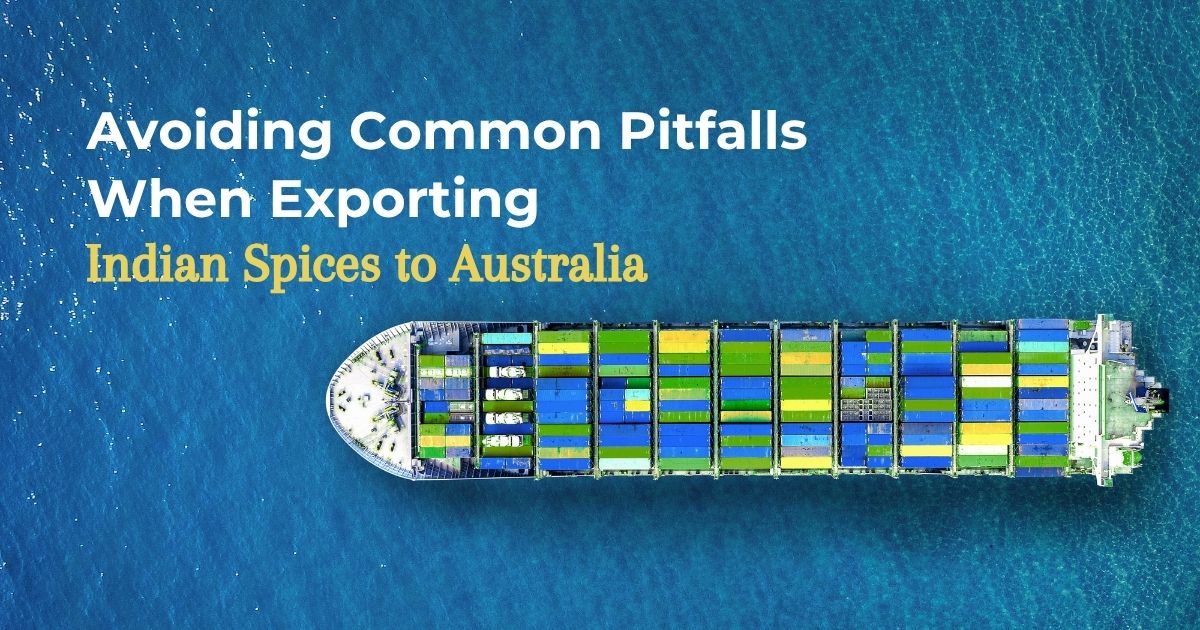Avoiding Common Pitfalls When Exporting Indian Spices to Australia

Strong 8k brings an ultra-HD IPTV experience to your living room and your pocket.
Imagine this: A spice trader in Kerala partners with an export logistics company to deliver spices to a boutique grocery chain in Melbourne. They love his cardamom, they say, and want a regular monthly supply. He’s thrilled—it’s the opportunity of a lifetime. But by the second shipment, things go awry. Delayed clearance, fumigation issues, and customs penalties. What was supposed to be a smooth export turns into a sticky situation.
Exporting Indian spices to Australia can be a highly rewarding venture, provided you know the terrain. This blog is your guide to understanding the opportunities, the requirements, and the hidden snags that could trip you up if you’re not careful.
The Growing Appetite for Indian Spices in Australia
Australia is not just home to kangaroos and koalas; it's a place for food lovers too. The country has seen a big jump in the demand for real global tastes, mostly Indian spices. With more Indians moving there and locals who like to try new tastes, spices such as turmeric, cumin, coriander, and garam masala are now hot items.
Indian sellers now have a great chance to fill this rising need. Yet, as the need grows, so does the close watch. Australia checks very hard on biosecurity, food safety, and quality. So, it's not only about sending the product—it's about sending it right.
Documents You Need for Exporting Spices to Australia
Before your spice-filled boxes reach Australia, your papers need to be right. Not having the right papers or having mistakes in them is a big reason why customs might say no and cause hold-ups.
Here’s a fast list of key papers the export logistics company will need from you:
Import Permit (from the Australian authorities – usually the Department of Agriculture, Fisheries and Forestry)
- FSSAI License (India)
- Spice Board Registration-Cum-Membership Certificate (RCMC)
- Certificate of Origin
- Phytosanitary Certificate (mandatory for plant-based exports like spices)
- Bill of Lading / Airway Bill
- Commercial Invoice & Packing List
- Pesticide Residue Certificate (if required)
- Fumigation Certificate (especially for whole spices)
Each document plays a vital role. For instance, the Phytosanitary Certificate proves your spices are pest-free, while the Import Permit confirms Australia is willing to accept the product. Skipping even one could mean your entire shipment is held or destroyed.
Top Indian Spices Exported to Australia
Australia gets many types of Indian spices, but some are more common:
- Turmeric (Haldi): Loved by those who care a lot about health and different ways to heal.
- Cumin (Jeera): Key ingredient in food from India and the Middle East.
- Coriander (Dhania): Used as seeds and as a powder.
- Cardamom (Elaichi): Wanted in high-end shops and fancy food places.
- Chilli (Lal Mirch): In Australia, they like their food with some spice, often in mixed food styles.
- Fenugreek (Methi): It is known for how it can make you feel better.
- Curry Powder & Garam Masala: Mixed spice sets are doing really well for quick-cooking foods.
When sending goods out, it's key to know the type of spice, whole or ground, as they might be checked in different ways.
Challenges of International Spice Trading: What The Export Logistics Company Goes Through
You have got the best batch of hand-picked cardamom. The paperwork is ready. And yet—something goes wrong. These are common pitfalls that logistics companies often encounter:
1. Biosecurity Roadblocks
Australia guards its land well. Even a small bit of bugs or fungus can make them say no to a whole box. For example, wood packing has to meet ISPM-15 rules.
2. Non-Compliance with Maximum Residue Limits (MRLs)
Indian agricultural produce sometimes exceeds the strict chemical residue thresholds set by Australian law. Spices must be thoroughly tested before dispatch.
3. Temperature and Moisture Control
Spices are soft. Too much wetness while moving can make mold, more so on long sea trips. Right boxes, dryness takers, and at times temp-kept boxes are key.
4. Delays in Customs Clearance
Even with the right documents, any mismatch in declarations can lead to inspection delays, causing financial and reputational losses.
5. Inadequate Labelling
Australia has specific labeling requirements. The product label must clearly mention:
- Common and scientific name
- Country of origin
- Batch code
- Net weight
- Best before date
- Any allergens
Failure to comply can result in re-labelling at the port or, worse, rejection.
Things to Consider Before Entering The Australian Spice Market
So, do you understand just what it will take to make it work?
Understand the Market Landscape
It's not just about knowing what spices sell; you must know where they sell. For instance, city places like Sydney and Melbourne are different from country towns.
Choose the Right Buyer or Distributor
Work with a buyer who understands your product and is familiar with the import process. Often, new exporters fall into the trap of partnering with fly-by-night operators.
Stay Updated on Regulations
Australian import laws evolve. Keep track of updates from:
- The Australian Department of Agriculture
- The Food Standards Australia New Zealand (FSANZ)
- The Spices Board of India
Invest in Quality Control
Test your spices for purity, foreign particles, and pesticide residues. Certificates from NABL-accredited labs help build trust.
Leverage Technology in Logistics
A port to port shipping company using real-time tracking, smart inventory systems, and digital documentation can save you from unpleasant surprises during transit.
Conclusion
An export logistics company doesn’t just stuff spices in a bag and send them away. Logistics is a lot trickier than that. It’s an intricate art, much like the cooking that the spices will be utilised for. In order to sell spices, first you must understand the market.
Indian spices enhance the flavour of any food. No wonder there’s demand for it in other countries. Who doesn’t love tasty food? Increasing the richness of taste is the legacy of Indian spices.
If you choose to be a spice trader to Australia, you will need to partner with a reliable logistics company and hire a food technologist to audit the quality of your goods. Through this way, your spice business will be successful.
Frequently Asked Questions
Q1. How to export spices from India to Australia?
If you’re looking to export spices from India to Australia, you’ll need the proper documents first. You also need to know the food safety rules and follow all their regulations if you want smooth business operations.
Q2. Are Indian spices allowed in Australia?
Yes, it is allowed, but only if it passes the quality tests in Australia. Safety comes first in the spice trade, and if you’re tagging items incorrectly or missing documents, reports, etc., you will not be allowed to sell there.
Q3. Can I export spices from India?
Yes, anyone or any firm can send spices from India once they sign up with the Spices Board of India and get the right papers, like the Import Export Code (IEC) and FSSAI license. You must also follow the rules of the place you're sending them to.
Q4. What is most exported from India to Australia?
Australia is the biggest buyer of these Indian goods: refined oil products, drugs, jewels, clothes, machines, and food items, including spices like turmeric, cumin, chili, and more.
Q5. Which items are not allowed in Australia from India?
Australia definitely has limitations on which items to import. Things like raw meat, milk, fresh fruits and veggies, and seeds that are not treated are not allowed from India.
Q6. What spices are popular in Australia?
Australia is a big fan of turmeric, garam masala, chili powder, fennel, and such spices.
Note: IndiBlogHub features both user-submitted and editorial content. We do not verify third-party contributions. Read our Disclaimer and Privacy Policyfor details.







